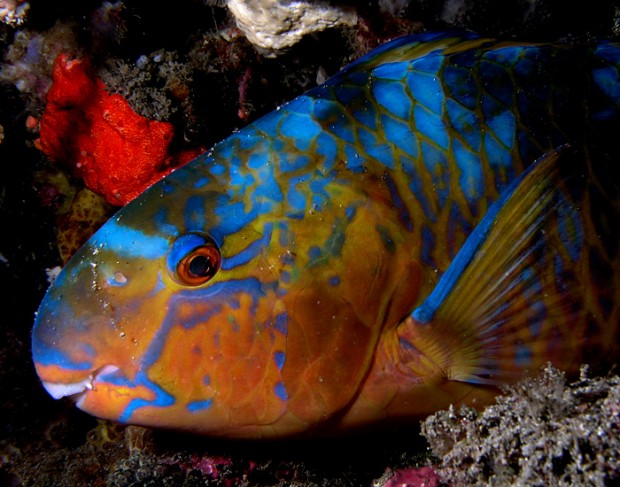Bermuda Parrotfish Keep Coral Reefs Healthy
The parrotfish, a species of marine life abundant in Bermuda’s waters, is singlehandedly working to keep both the coral reefs and beaches surrounding the island healthy, all thanks to their voracious appetite and ability to defecate up to 200 pounds of sand per year, with a recent report highlighting the fact that areas that don’t protect the valuable fish are seeing their reefs decline at an alarming rate.
According to a National Geographic report, “Parrotfish are colorful and voracious herbivores that spend up to 90 percent of their day eating algae off of coral reefs. And they poop sand [up to 200 pounds of it per year], keeping beaches beachy.
“However, parrotfish have been overfished and Caribbean reefs have gotten increasingly furry with algae over the past decade, resulting in a far less pretty picture, and a far less productive and resilient ecosystem.”
Parrotfish
According to a report recently released by the Global Coral Reef Monitoring Network of IUCN [PDF here] – a report compiled by 90 experts that analyzed 35,000 surveys conducted at 90 locations around Bermuda and the Caribbean since 1970, says National Geographic – corals in the general region have declined by more than 50 percent since the 1970s; despite this decline, corals surrounding areas with high parrotfish populations, including Bermuda, remain relatively healthy.
The report’s release coincides with the recent Reef Watch 2014 event that saw so-called citizen scientists take stock of the health of Bermuda’s coral reefs.
“The healthiest reefs are those that still have robust parrotfish populations, such as Bermuda and Bonaire, which restricted or banned fishing practices that harm parrotfish, such as fish traps and spearfishing. Overfishing is the primary factor determining current Caribbean coral health, not climate change or pollution.”
A report in the International Business Times says, “According to the study, the least degraded coral reefs are characterised by a vigorous population of parrotfish, such as in the lower Garden Banks National Marine Sanctuary in the northern Gulf of Mexico, and in Bermuda and Bonaire.”
Parrotfish – Lawnmowers of the Reef:
“In these areas fishing that harms parrotfish is banned or severely restricted.
“Areas, such as Jamaica, the entire Florida Reef Tract from Miami to Key West, and the US Virgin Islands – where parrotfish are not protected – have suffered tragic reef declines.
“The report authors explained that restoring parrotfish populations and improving protection from overfishing and excessive coastal pollution could help the reefs recover. They also suggested that parrotfish should be listed in the Annex II and III of the SPAW Protocol [The Protocol Concerning Specially Protected Areas and Wildlife].”
Read More About
Category: All, Environment


